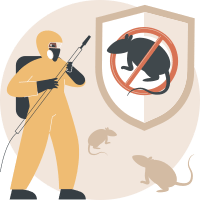Wasp Control
Wasps can be highly aggressive and will sting repeatedly if they feel their nest is threatened. Each year, wasp stings result in several fatalities, as even those not allergic to stings can experience serious health issues after multiple stings. When a wasp stings, it releases a pheromone, alerting other wasps to join in defense, making the situation potentially dangerous.
While wasps contribute to natural pest control by feeding on flies and caterpillars, their populations are artificially high near human buildings, which offer ample nesting sites compared to natural habitats. In autumn, they cause extensive damage to ripening fruits.
Preparation Before Wasp Nest Treatment
Avoid Blocking Entrance Holes
Do not block the nest entrance, as this will make wasps more aggressive without killing the nest. They will simply find another entry point.
Aftercare Tips Following Wasp Treatment
- Activity Following Treatment: After treatment, wasp activity may remain elevated for up to 3 hours. Keep people and pets away from the area and close windows. Notify neighbours to steer clear of the treated zone.
- Key Points to Remember:
- A Treated Nest Won’t Be Reused: Once treated, a wasp nest will never be reused by the colony. o Wasp Nest Lifecycle: 7 to 8 months – Wasps cannot move from one nest to another. Nests are built in spring and grow to around 10,000 wasps by autumn.
- Safe Nest Removal: The nest material, similar to papier-mâché, is safe to leave behind, as it will not rot. If you plan to remove it, wait 4 weeks to ensure any remaining larvae have died out.
- Avoid Premature Removal: If removed too soon, foraging wasps will return, potentially attempting to rebuild the nest. By allowing them to contact the treated nest, they either become contaminated or exhaust themselves.
- Late-Season Treatment: For nests treated in autumn, it’s normal to see dying wasps and queens for up to 20 days after treatment. Never block nest entrances unless you are certain the nest is dead.
How Our Wasp Treatment Works?
Our trained technicians use a modern biodegradable insecticide that is highly toxic to wasps but low-risk for mammals. This ensures a safe and effective nest removal, protecting your home and reducing future infestations.
Why You Should Treat Wasp Nests?
If left untreated, a wasp nest will naturally die off but not before producing around 100 fertile queens. These queens hibernate over winter and start new nests in spring, leading to increased wasp populations in the following year. Wasps become most aggressive in autumn when they feed on rotting fruit, which can make them erratic and more likely to sting. Untreated nests can also stain ceilings or, in rare cases, even damage them.
Why Choose AM Environ for Wasp Control?
Contact Us for Reliable Wasp Control Services
If wasps are creating a hazard on your property, Contact AM Environ to schedule a consultation and discover how we can help you achieve a pest-free environment. Our experienced team is ready to provide safe, effective, and immediate wasp control services, giving you the peace of mind you deserve. Let us help you create a wasp-free environment with our expert solutions.

